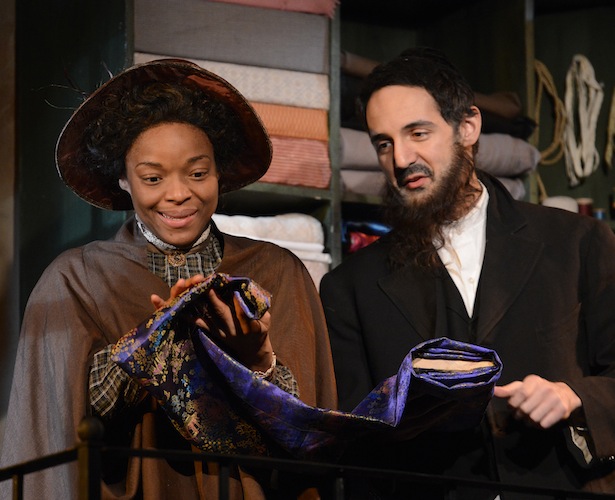Fuse Theater Review: “Intimate Apparel” — An Affecting Vision of Constriction
The Lyric Stage is presenting a moving production of Lynn Nottage’s cautionary tale about strength of character tragically misdirected.
Intimate Apparel by Lynn Nottage. Directed by Summer L. Williams. Staged by the Lyric Stage Company of Boston at 140 Clarendon Street, Boston, MA, through March 14.

Lindsey McWhorter (Esther) and Nael Nacer (Mr. Marks) in the Lyric Stage production of “Intimate Apparel.” Photo: Glenn Perry.
By Bill Marx
Lynn Nottage’s affecting Intimate Apparel and Edith Wharton’s great novel House of Mirth share some fascinating similarities. The book was published in 1905, the year the play is set, and both stories deal with determined and flawed women who are trying, but failing, to be upwardly mobile in a patriarchal/racist society dead set against their attempts to rise. Of course, Wharton’s Lily Bart is young, white, and attractive, a woman who through verve and wit is trying to jump over barriers of class and marry well. She is tripped up by her ambition — as well a few double-dealing allies and the ineffectual man who cares for her — eventually dying in poverty. Nottage’s Esther is an unattractive black seamstress in her mid-30s who wants to start up a beauty parlor with the money saved by sewing intimate apparel for customers who range from wealthy white women to prostitutes. Yet, like Lily, she craves to be married, and that yearning leads to betrayal and hardship. At the turn-of-the-century a life of independence for women wasn’t even a dream — both of these stories are moving cautionary tales about strength of character tragically misdirected.
Like Wharton, Nottage gives us a romantic possibility that proves to be untenable. Esther cares for a kindly Hasidic shopkeeper (Mr. Marks — a terrific name) from whom she purchases her fabrics. He returns her affection. Still, despite the fact that they share sensibility that sets them apart from others (humility and an appreciation of beauty), the hopelessness of the attraction is obvious to them both. Instead, elegantly written letters from George, who is working on the construction of the Panana Canal, attract the lonely Esther, who is illiterate — her patrons read the correspondence and then write Esther’s responses. Eventually, George convinces Esther to marry him sight unseen. Each enters wedlock with misconceptions about the other — their life together is a lie.
Nottage gently but firmly looks at the reasons behind Esther’s blindness, using the seductive allure of lingerie and eye-catching clothing to explore how sexuality serves as an attractive trap for Esther and her clients — they connect appearance with power, which means, particularly for women, that their boudoirs are where they are at their freest and most imprisoned. Esther’s rich, unhappily married white client is desperate for genuine affection, while Esther’s lively friend, a black prostitute, has limited her horizons to her body. Only Mrs. Dickson, the widowed middle-aged pragmatist who owns a boarding house, is aware of the pitfalls for women who see their bodies as a means of satisfaction — and her combination of compassion and hardness makes her one of the play’s more complex characters, outside of Esther.
The Lyric Stage production is smoothly directed by Summer L. Williams and very well-acted, particularly by Lindsey McWhorter, whose Esther knits together external awkwardness with a delicate internal resilience. The actress offers agile glimpses of the frustrations and desires that lie underneath the character’s introverted surface. It is too bad that Nottage only gives the character a single scene in which to explode — when Esther finally sees just where her delusions of domesticity have landed her McWhorter grabs on hard and delivers jolts of memorable outrage. Cheryl D.Singleton is also effective as Mrs. Dickson; the actress does not shy away from digging into the character’s placid imperiousness. The other performers are fine, but limited by Nottage’s determination to make the play a character portrait of Esther. The figures around the heroine aren’t given much spin: the men are schematic — the good-goody Mr. Marks (a sugary Nael Nacer) versus the bedeviled George (a preening Brandon G. Green). Outside of Esther and Mrs. Dickson the female characters are also undernourished: Kris Sidberry adds some bluesy pizazz (I wish there was more) to the role of the prostitute Mayme, while Amanda Ruggiero is a bit bland as Mrs. Van Buren, who is pampered to the point of near emotional extinction.
As moving as the Lyric Stage’s Intimate Apparel is, this remains a somewhat constricted script about constrictions — social, sexual, and psychological. I saw a student production of the play a couple of years ago at Boston University and came away with the same reaction: a deep respect for Nottage’s sympathetic recreation of the past along with a wish that the playwright had conjured up a richer dramatic palette. (Her 2009 Pulitzer Prize winning play Ruined ventures into more complex territory.) It is not enough to just make us feel for Esther’s sad plight — we must be invited to think about a society that encourages these kind of pleasureable (?) prisons, self-made and otherwise. That calls for a more unruly and expansive dramatic approach — and Intimate Apparel is cinched too tight for that.
Bill Marx is the Editor-in-Chief of The Arts Fuse. For over three decades, he has written about arts and culture for print, broadcast, and online. He has regularly reviewed theater for National Public Radio Station WBUR and The Boston Globe. He created and edited WBUR Online Arts, a cultural webzine that in 2004 won an Online Journalism Award for Specialty Journalism. In 2007 he created The Arts Fuse, an online magazine dedicated to covering arts and culture in Boston and throughout New England.
Tagged: African-American, Intimate Apparel, Lynn Nottage, Lyric stage company of boston
